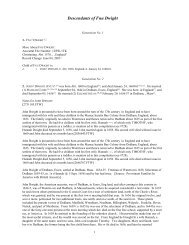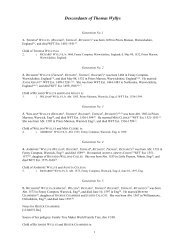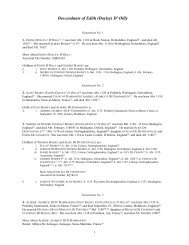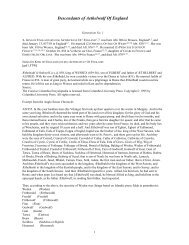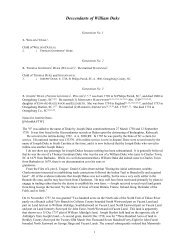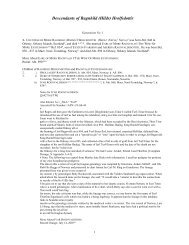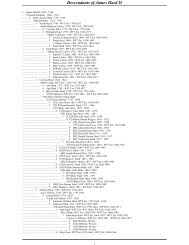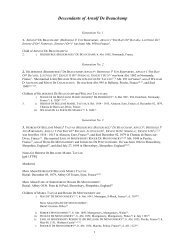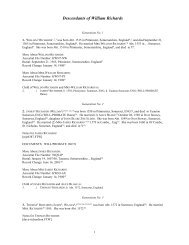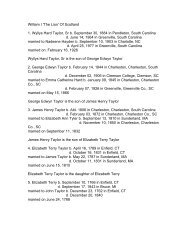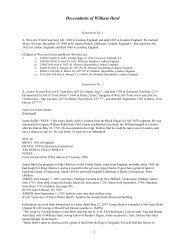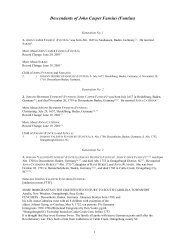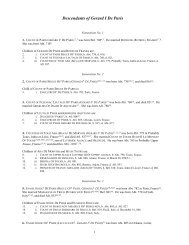William Of Autun.pdf - GBLCreations
William Of Autun.pdf - GBLCreations
William Of Autun.pdf - GBLCreations
Create successful ePaper yourself
Turn your PDF publications into a flip-book with our unique Google optimized e-Paper software.
y the English, succeeded his b rother at his death. Philip formally renewed the treaties, but in 1675 , after the<br />
Pilgrims made increasing demands for Native American land, Ph ilip led an uprising against the settlers in what is<br />
now called King Phil ip's War.<br />
The first Thanksgiving Day celebration was organized by Bradford i n 1621. Hare's "Five Kernels of Corn"<br />
tells the story surrounding this ev ent:<br />
"It was a cold, gray day on November 15, 1620. The Mayflower rode a t anchor near the shore, while a group<br />
of eager men set out in a small bo at to explore the desolate, barren land to which they'd come. One of th e first<br />
things they discovered near the beach was a deserted cornfield wh ere the dry, broken stalks rustled in the sharp<br />
wind. Nearby they saw se veral strange mounds. Upon digging into one, they were amazed to find od d-looking,<br />
yellow, red and blue Indian corn. They took some with them t o use of seed when they planted their crops in the<br />
spring. They couldn' t know then how important that corn would prove to be to the colony's fut ure. They weren't<br />
prepared for that first dreadful winter, and there wa s much sickness. Nearly half the colonists died before spring<br />
finally ar rived. <strong>Of</strong> those who survived, about half were children not yet sixteen y ears old; and only five married<br />
women remained. When spring came, the me n and boys planted 20 acres of Indian corn. Six additional acres<br />
they pl anted with the seeds they'd brought from England - wheat, rye, barley an d peas - and there were vegetable<br />
gardens near the houses. But to everyo ne's dismay, the seeds they'd brought failed to produce, being unsuited t o<br />
the growing conditions in New England. The colonists worried whether th ey'd have enough food for the winter.<br />
Grain crops were necessary for the ir survival, for they provided the bread and puddings that gave them th e<br />
energy they needed to work and endure the harsh conditions in which the y lived, and the nourishment the<br />
children needed for adequate growth. T o supplement their store of grain, they learned, with help from the India<br />
ns, to catch the fish, to shoot the fowl and deer, and to harvest the wil d fruits and berries that the forest and sea<br />
provided. They dried and pr eserved as muchas they could in anticipation of another long winter wit h little grain.<br />
In late fall, despite their small corn harvest, they fel t confident and grateful for what they'd accomplished. They<br />
decided to c elebrate what they called the Harvest Thanksgiving. They were joined b y 90 of their Indian friends<br />
who stayed for three days enjoying their hos pitality. This was an unexpected drain on their food supplies, but the<br />
y believed that, by careful management, they would have enough to last un til the next year. The ship Fortune<br />
arrived a few days later. The happ y Pilgrims expected to welcome members of their families and friends wh o<br />
had been left behind. They also believed the ship would bring food an d other provisions they needed. They<br />
were distressed to learn, however , that it brought 35 colonists instead. Most of them were young men wh o<br />
brought no tools, bedding, or food, possessing little more than what th ey wore. There was nothing for the<br />
Pilgrims to do but to share their mea ger clothing, their homes and their precious food with the strangers. Th e<br />
sailors aboard the Fortune, too, needed food for the long voyage back t o England, so again the Pilgrims shared<br />
what they had. As the months pas sed, every colonist knew daily hunger. They lived on half rations for si x<br />
months.... They might have perished had they not been able to obtain so me grain from the English fishing<br />
villages along the coast of Maine... Wh ile the year before had been very bad, the Starving Time came upon the li<br />
ttle colony the spring of 1623. Tradition tells us that each person rece ived only five kernels of parched corn a<br />
day. Governor Bradford wrote th at they had neither bread nor corn for two or three months together, an d their<br />
entire diet consisted of only fish and water. To add to their mi sery, the early summer weather was hot and dry,<br />
and the corn began to wit her. In desperation they went one day to the top of the hill to pray t o God for relief.<br />
That night a soft rain began to fall, and the drough t was broken. At harvest, every field produced an abundance<br />
of corn, wit h enough for everyone. After nearly three years, the famine was over."<br />
On 16 September 1633 <strong>William</strong> Wright, husband of Alice's sister Priscilla, appointed "his beloved friend and<br />
brother <strong>William</strong> Bradford, to hav e an oversight of this will".<br />
"The last Will and Testament Nunckupative of Mr. <strong>William</strong> Bradford se nir: Deceased May the Ninth 1657<br />
and exhibited to the court held att Plym outh June 3d 1657.<br />
"Mr. <strong>William</strong> Bradford senir: being weake in body but in prfect memor y haveing Defered the forming of his<br />
Will in hopes of haveing the healp o f Mr. Thomas Prence therin; feeling himselfe very weake and drawing on t o<br />
the conclusion of his mortall life spake as followeth: I could have Des ired abler then myselfe in the Desposing of<br />
that I have; how my estate i s none knowes better then youerselfe, said hee to Lieftenant Southworth ; I have<br />
Desposed to John and Willam alreddy their proportions of land wh ich they are possessed of;<br />
"My Will is that I stant Ingaged to prforme to my Children and other s may bee made good out of my estate<br />
that my Name Suffer not ;<br />
"ffurther my Will is that my son Josepth bee made in some sort equal l to his brethern out of my estate ;<br />
"My further Will is that my Deare & loveing wife Allice Bradford sha lbee the sole Exequitrix of my estate;<br />
and for her future maintainance m y Will is that my Stocke in the Kennebecke Trad bee reserved for her Comf<br />
ortable Subsistence as farr as it will extend and soe further in any suc h way as may bee Judgedbest for her ;<br />
90



